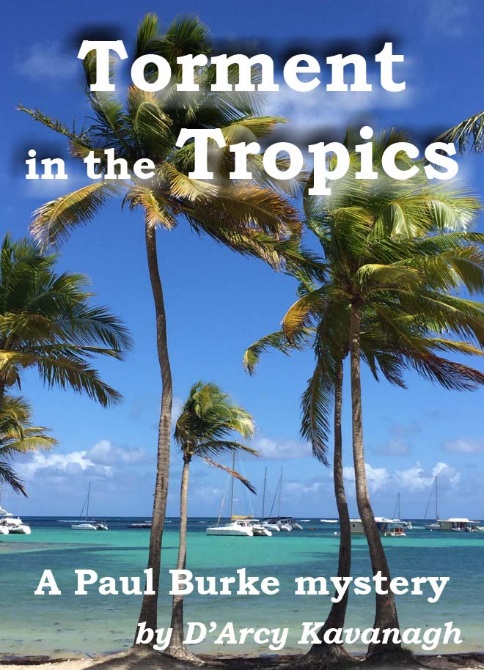
Look for the sixth
Paul Burke mystery:

The small, white car darted in front of Paul Burke and sped out of the roundabout. If Burke hadn’t been sweating enough before, he was drenched after the near-miss.
He walked quickly to the far curb and stopped for a moment to slow his heartbeat. The people of Guadeloupe were generally polite, generous, funny and kind, but behind the wheel they drove like they were candidates for a Grand Prix race. This last motorist was a prime example.
Burke set off again. He had only another block to reach the parking lot where all the TV trucks would be and where he’d be providing colour commentary for the third stage of the eight-stage Tour de Guadeloupe bike race.
It was a good gig and one he’d never expected. Three months before while relaxing at home along the French Riviera, he’d gotten a phone call from one of the Tour of Guadeloupe’s main organizers asking if he could work as a “special guest commentator” for the upcoming race, all expenses covered with a nice wage on the side.
When Burke had questioned why he was getting the offer, the organizer had said the people of Guadeloupe, which was part of France despite being in the Caribbean, were cycling enthusiasts who knew his name from not just his racing days, but his blog. They also knew he’d been involved in several murder investigations connected to different bike races, including the world’s most famous one, the Tour de France. He had name recognition and that would be good for the broadcast.
Since he hadn’t anything on his schedule, Burke had accepted, especially since he could blog from the island.
The only aspect of the trip that had concerned him was he’d be in Guadeloupe during the height of the Caribbean hurricane season. He’d endured one hurricane years before in Mexico and never wanted to re-live the experience. But the organizer had assured him that Guadeloupe, for some strange reason, was rarely hit as hard by hurricanes as other nearby islands.
Now, as he walked toward the parking area in the southeast town of Saint-François, he thought about the morning’s weather report which had predicted an approaching tropical storm might morph into a hurricane – and possibly within 48 hours. But when he looked around at the shops and houses in this part of Saint-François, he saw no one displaying any urgency. They were just going about their daily routine in this pleasant, quiet coastal community of 12,000.
Or maybe, Burke thought, they hadn’t heard the weather report.
Burke followed the sidewalk which passed by the far end of Saint-François’ golf course, the only one on Guadeloupe. He noticed a handful of golfers strolling down a fairway, looking like they didn’t have a care in the world beyond their upcoming approach shots. Maybe he really was worrying about nothing.
When he reached the parking lot, Burke stopped and ran a handkerchief over his forehead. He had been in warm places before, but this was a whole new level of heat and humidity. He doubted if he could sweat any more profusely.
“Good morning, Paul.”
Burke turned to see Freddy Napoule, the race organizer, heading his way, his usual grin firmly in place. For someone who had countless tasks to handle on a daily basis, the 50-something Napoule remained calm throughout every task and every problem. Burke liked his company and admired his expertise. The Tour de Guadeloupe was a model of efficiency, largely due to the man before him.
They shook hands and Burke was about to ask Napoule about the weather report when Napoule’s administrative assistant Jean Dupuis trotted over.
“Freddy, something’s happened,” Dupuis said, looking worried.
Napoule’s smile weakened a bit. “Tell me, Jean.”
“Two of the racers on the Venezuelan team are missing. They went out for a warm-up ride this morning and haven’t been seen since.”
“Maybe they took a wrong turn and got lost. I’m sure they’ll be here in time.”
Dupuis nodded. “I hope so and so does their team manager. He’s getting a little anxious.”
Burke spotted a tall, broad-shouldered woman in her 30s wearing beige slacks and a blue polo top with an insignia of some kind approaching.
“Freddy, I have some news for you,” the woman said, stopping a metre from the small group.
The insignia on her shirt said S.W. Security over crossed swords. Above was a nametag: Elodie Morel.
“What now?” said the race organizer.
“It’s something we should discuss in private,” she said.
Napoule gestured toward his assistant. “Jean has already told me about the missing Venezuelan racers.”
“Well, Freddy, they’re not missing anymore,” Morel said.
“OK, where are they?”
Morel glanced at Burke and Dupuis, and then shrugged. She looked back at Napoule. “They’re dead.”
“What? They were only out on a warm-up ride.”
“They were found in a mass of seaweed in a bay three kilometres from here. They were definitely dead. And they were definitely the Venezuelans.”
“Damn!’ Napoule said.